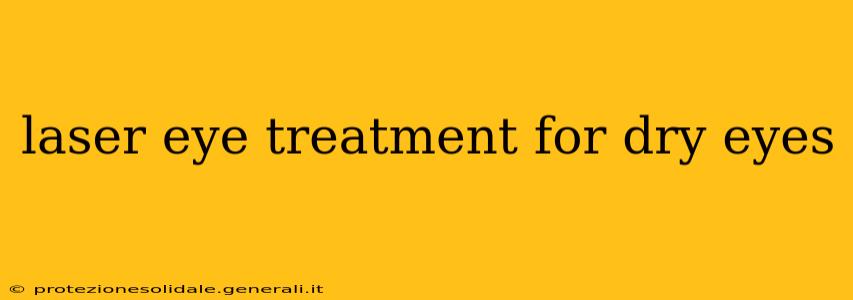Dry eyes are a common condition affecting millions, causing discomfort, irritation, and blurry vision. While many treatments exist, some individuals explore laser eye treatments hoping for a solution. This comprehensive guide explores the relationship between laser eye surgery and dry eyes, addressing common questions and concerns. It's crucial to understand that laser eye surgery itself doesn't directly treat dry eyes, but certain procedures might indirectly influence the condition.
Does LASIK Make Your Eyes Dry?
Yes, LASIK and other refractive surgeries like PRK can potentially worsen dry eyes, at least temporarily. This is because the procedure involves altering the cornea, the front surface of the eye. The cornea plays a crucial role in tear film production and stability. During LASIK, a flap is created in the cornea, and this process, along with the subsequent laser ablation, can disrupt the nerve endings responsible for tear production and the overall health of the ocular surface. The dryness is often temporary, improving within several months, but in some cases, it can be persistent. The severity of dryness varies depending on individual factors and the type of surgery performed.
Can Laser Eye Surgery Help Dry Eyes?
No, laser eye surgery is not a treatment for dry eyes. It addresses refractive errors like nearsightedness, farsightedness, and astigmatism, improving vision clarity. However, it doesn't directly address the underlying causes of dry eye disease, such as insufficient tear production, tear film instability, or meibomian gland dysfunction. In fact, as mentioned earlier, it can potentially exacerbate pre-existing dry eye conditions.
What Types of Laser Eye Surgery Exist?
Several types of laser eye surgery are available, each with its own procedure and potential impact on dry eyes:
- LASIK (Laser-Assisted In Situ Keratomileusis): The most common type, it involves creating a corneal flap, ablating the underlying tissue with a laser, and then replacing the flap. This procedure carries a higher risk of temporary, and sometimes persistent, dry eye symptoms.
- PRK (Photorefractive Keratectomy): This procedure removes the top layer of the cornea before laser ablation, leading to a longer recovery period and a potentially higher risk of temporary dry eye.
- SMILE (Small Incision Lenticule Extraction): This minimally invasive procedure creates a smaller incision than LASIK, resulting in a potentially lower risk of dry eye complications, though dryness can still occur.
What are the Common Symptoms of Dry Eyes After Laser Surgery?
Common symptoms of dry eye after laser surgery include:
- Burning or stinging sensation: This is often the most prevalent initial symptom.
- Itching: A persistent itchiness around the eyes.
- Foreign body sensation: Feeling like something is in your eye.
- Blurred vision: Temporary blurring is common, but persistent blurring could indicate a problem.
- Increased sensitivity to light: Photophobia, or sensitivity to light, may occur.
What are the Long-Term Effects of Laser Eye Surgery on Dry Eyes?
For most individuals, any dry eye symptoms following laser surgery are temporary, resolving within a few months. However, some individuals may experience persistent dry eye, requiring ongoing treatment with lubricating eye drops, warm compresses, or other therapies. The long-term effects depend heavily on individual factors, pre-existing conditions, and the type of surgery performed. Your ophthalmologist will thoroughly assess your risk factors before recommending any procedure.
How Can I Prevent or Treat Dry Eyes After Laser Eye Surgery?
Your ophthalmologist will provide specific post-operative instructions, which typically include using artificial tears regularly to lubricate your eyes and maintain adequate hydration. Other measures may include:
- Warm compresses: These help to express the meibomian glands, improving tear quality.
- Lid hygiene: Proper cleaning of the eyelids to remove debris and prevent inflammation.
- Omega-3 fatty acid supplements: These may improve tear film quality.
- Punctal plugs: Small devices inserted into the tear ducts to reduce tear drainage.
Disclaimer: This information is for educational purposes only and is not a substitute for professional medical advice. Always consult with an ophthalmologist to determine the best course of treatment for your individual needs. They can assess your eye health, discuss your candidacy for laser eye surgery, and manage any potential dry eye complications.
